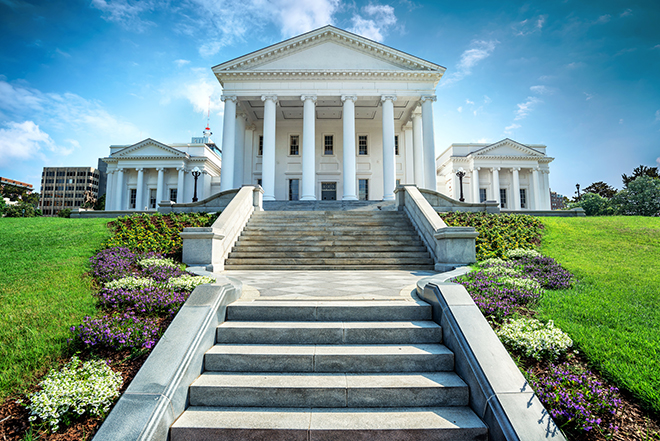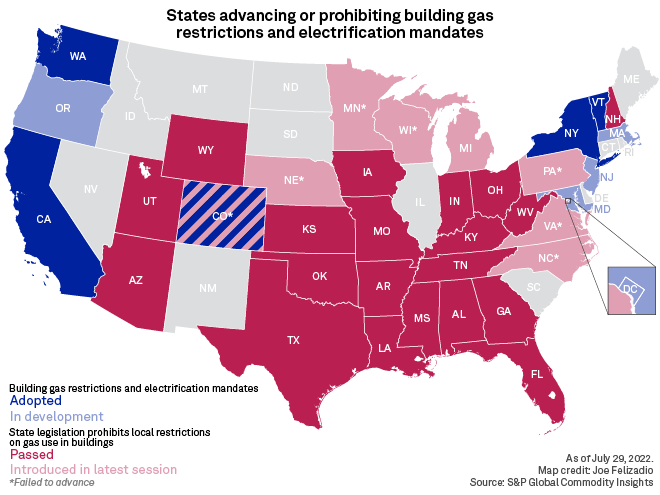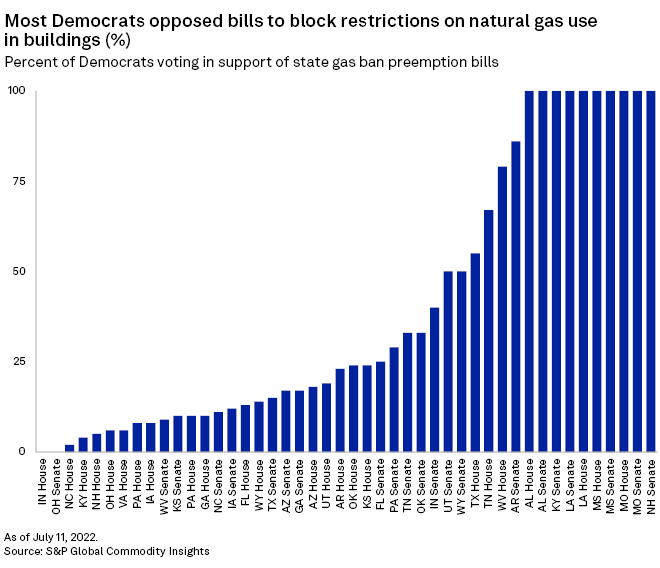S&P Global Offerings
Featured Topics
Featured Products
Events
S&P Global Offerings
Featured Topics
Featured Products
Events
S&P Global Offerings
Featured Topics
Featured Products
Events
Banking & Capital Markets
Economy & Finance
Energy Transition & Sustainability
Technology & Innovation
Podcasts & Newsletters
Banking & Capital Markets
Economy & Finance
Energy Transition & Sustainability
Technology & Innovation
Podcasts & Newsletters
S&P Global Offerings
Featured Topics
Featured Products
Events
11 Aug, 2022

|
Virginia became the latest politically divided state where Democratic opposition sank a bill prohibiting local governments from restricting natural gas use in buildings. |
The Virginia General Assembly took steps to prevent a sudden shutdown of municipal natural gas utility service in cities combating climate change, but lawmakers opted against joining at least 20 other states that have prohibited local governments from restricting gas use in buildings.
The passage of Virginia House Bill 1257 was the latest sign that the push to adopt gas ban preemption bills, known as fuel choice laws among supporters, may have plateaued. While these bills have attracted some bipartisan support, Republican proponents have suffered a series of defeats in politically divided states over the past year.

Still, Virginia's bill showed that some gas stakeholders are seeking assurances as building electrification mandates spread and cities in purple states like Virginia consider how to implement climate action plans. An overhaul of House Bill 1257 balanced opposition to preempting local authority over climate policy with concerns about suddenly halting service to Virginia businesses and manufacturers that depend on gas.
Gas ban preemption has swift death in Virginia
The attempt to preempt local gas bans in Virginia was short-lived. On Feb. 14, the Republican-controlled House of Delegates passed House Bill 1257, which sought to protect customer access to natural gas and propane. The bill would have prohibited the state, counties, cities and towns from adopting an ordinance, resolution or building code that would restrict access to gas utility service and propane.
Another provision in the bill would establish guidelines for a municipal utility that plans to terminate natural gas distribution service. The provision was a direct response to the Richmond City Council's September 2021 climate resolution, which committed to phasing out gas use, according to Brett Vassey, president and CEO of the Virginia Manufacturers Association. In the resolution, the council said the city's operation of Richmond Gas Works was an obstacle to achieving its climate goals. Charlottesville and Danville also operate municipal utilities in Virginia.
The prospect of the cities suddenly winding down municipal gas distribution service presented an "existential threat" to dozens of Virginia manufacturers that rely on natural gas, Vassey said in an interview.
Meanwhile, environmentalists and Democrats opposed the gas ban preemption provision, which they said would strip local governments of their ability to set climate policy. While HB 1257 received unanimous support among House Republicans, just 6% of voting Democrats cast their ballots in the bill's favor. This ranks among the lowest levels of Democratic support in 46 statehouse votes on gas ban preemption bills across the country as reviewed by S&P Global Commodity Insights.

Seeking to strike a compromise, Democratic Sen. Joseph Morrissey offered a last-minute substitution in the Senate Committee on Agriculture, Conservation and Natural Resources on March 1. The substitution stripped the gas ban preemption provision from HB 1257 and preserved the guidelines for cities seeking to divest municipal gas utility assets.
Republican House Majority Leader Terry Kilgore, who introduced the bill, also played a role in revamping the legislation, the Virginia Mercury reported. Kilgore's office did not respond to requests for comment.
Bill gets support from business groups, environmentalists
The final version of HB 1257, ironed out in a conference committee, required municipal gas utilities to give at least three years' notice of their intent to suspend service. They must then attempt to negotiate a sale of their assets. If they do not reach a deal within two years, the assets would be offered in a public auction.
The House passed the conferenced bill on March 13, but the regular session ended before the legislation could cross the finish line. Lawmakers passed the bill on June 17 during a special session, and Republican Gov. Glenn Youngkin approved it on Aug. 4.
The reworked bill drew support from business groups, including the Virginia Manufacturers Association and the Virginia Chamber of Commerce, as well as environmental organizations.
"We are glad the General Assembly chose to preserve local authority and some of the possible tools for creating a clean energy economy," Peter Anderson, Virginia policy director at environmental advocacy group Appalachian Voices, said in an email. "As initially filed, HB 1257 would have defied common sense by forcing investment in new assets that would be stranded in just a few years."
As passed, the bill would protect consumers if Virginia's three municipal utilities decide to discontinue service, Anderson said. Asked whether Richmond planned to explore winding down Richmond Gas Works, the city did not respond by the time of publication.
Among the investor-owned utilities that stood to benefit from the gas ban preemption provision are Atmos Energy Corp., NiSource Inc. subsidiary Columbia Gas of Virginia Inc., AltaGas Ltd. subsidiary Washington Gas Light Co. and Southern Co. subsidiary Virginia Natural Gas Inc.
S&P Global Commodity Insights produces content for distribution on S&P Capital IQ Pro.
